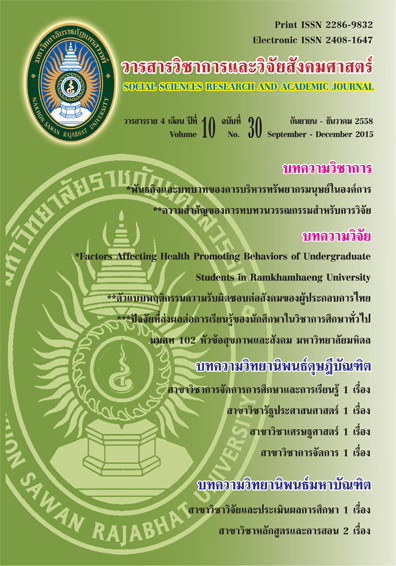ทางเลือกการศึกษาของเยาวชนในครัวเรือนยากจนและแรงจูงใจ สำหรับการเรียนอุดมศึกษาหลักสูตร 2 ปี (ปวส.); Educational Choices for Children of Poor Households and Incentives for Vocational Higher Education (2 years)
Main Article Content
Abstract
บทคัดย่อ
บทความนี้วิเคราะห์การตัดสินใจของครัวเรือนเกี่ยวกับทางเลือกการศึกษาต่อในระดับอุดมศึกษาหลักสูตร 2 ปี (ปวส.) ของนักเรียนสายสามัญและอาชีวศึกษา โดยสำรวจข้อมูลปฐมภูมิจากตัวอย่างครัวเรือน 662 ราย จากสี่จังหวัด นำมาวิเคราะห์สถิติเชิงพรรณนาและ สมการถดถอยโพรบิต เพื่อทราบการตัดสินใจศึกษาต่อและทางเลือกในการศึกษาต่อระดับอุดมศึกษาหลักสูตร 2 ปี (ปวส.) โดยทดสอบข้อสันนิษฐานกับตัวแปรอิสระบางตัว พบว่า ก) รายได้เป็นตัวแปรสำคัญที่สุดต่อการตัดสินใจศึกษาต่อระดับอุดมศึกษา แต่รายได้ที่เพิ่มขึ้นจะลดโอกาสเลือกเรียน ปวส. ข) สินทรัพย์สุทธิของครัวเรือนสนับสนุนให้มีโอกาสศึกษาต่อของนักเรียนสายสามัญ ค) เวลาของพ่อแม่ที่เอาใจใส่การเรียนแก่บุตรผกผันกับโอกาสการศึกษาต่อ ปวส. ของนักเรียนสายสามัญ ง) ทัศนคติของผู้ปกครองมีนัยสำคัญต่อโอกาสการศึกษาต่อ ปวส. นอกจากนี้มาตรการการคลังเพื่อการศึกษาที่เสนอทุนให้เปล่าแก่นักเรียนยากจนเป็นการขยายโอกาสให้เรียนอุดมศึกษาหลักสูตร 2 ปี (ปวส.) เพิ่มขึ้นร้อยละ 4 หรือเท่ากับ 6,000 คนต่อปี จะมีค่าใช้จ่ายทางการคลังของภาครัฐปีละ 912 ล้านบาท เป็นการพัฒนาทุนมนุษย์ในกลุ่มคนจนและเป็นเครื่องมือลดความเหลื่อมล้ำในสังคม
Abstract
This paper presents the decision-making of households about the educational choices for higher education, general and vocational track students. The data were surveyed of 662 students from households in four provinces in Thailand. It was analyzed by descriptive statistics and probit regression technique to investigate the decision-making of households about their children ’s educational choices in Vocational Higher Educational (VHE or 2 years) and Higher Education (Bachelor or 4 years) by testing the hypothesis with some independent variables. Our findings indicated that i) income was the most important variable to increase opportunities for continual studying in higher education, but it decreased opportunities to study in VHE; ii) the increasing in net wealth of households increased opportunities of general track students to continue studying in higher education; iii) parents’ time spending on child education decreased the opportunities of general track students to study in VHE; iv) parents’ attitudes were significant for the opportunities to study in VHE; v) the fiscal strategy for education that proposed the free supporting funds for poor students increased the educational opportunities and the proportion of the poor VHE students for at least 4 percent (6,000 students) per year. This means that there could be a 912 million baht Thai public burden and it might develop the human capital of the poor and reduce the inequality in Thai society.


